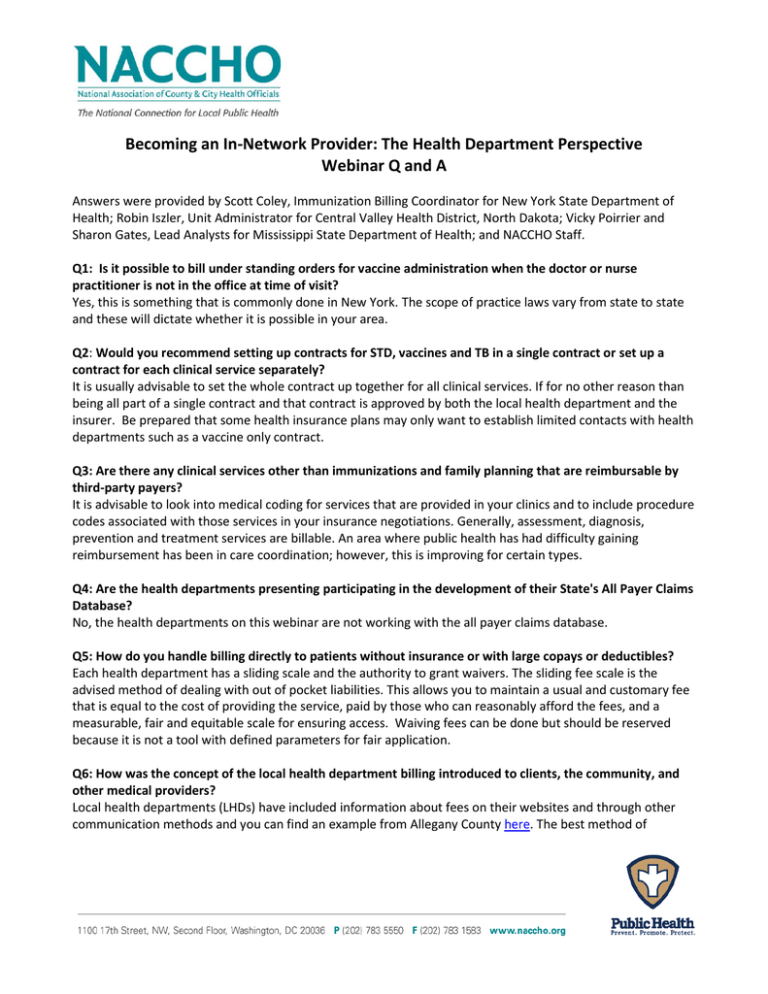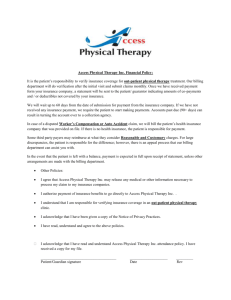Becoming an In-Network Provider: The Health Department Perspective
advertisement

Becoming an In-Network Provider: The Health Department Perspective Webinar Q and A Answers were provided by Scott Coley, Immunization Billing Coordinator for New York State Department of Health; Robin Iszler, Unit Administrator for Central Valley Health District, North Dakota; Vicky Poirrier and Sharon Gates, Lead Analysts for Mississippi State Department of Health; and NACCHO Staff. Q1: Is it possible to bill under standing orders for vaccine administration when the doctor or nurse practitioner is not in the office at time of visit? Yes, this is something that is commonly done in New York. The scope of practice laws vary from state to state and these will dictate whether it is possible in your area. Q2: Would you recommend setting up contracts for STD, vaccines and TB in a single contract or set up a contract for each clinical service separately? It is usually advisable to set the whole contract up together for all clinical services. If for no other reason than being all part of a single contract and that contract is approved by both the local health department and the insurer. Be prepared that some health insurance plans may only want to establish limited contacts with health departments such as a vaccine only contract. Q3: Are there any clinical services other than immunizations and family planning that are reimbursable by third-party payers? It is advisable to look into medical coding for services that are provided in your clinics and to include procedure codes associated with those services in your insurance negotiations. Generally, assessment, diagnosis, prevention and treatment services are billable. An area where public health has had difficulty gaining reimbursement has been in care coordination; however, this is improving for certain types. Q4: Are the health departments presenting participating in the development of their State's All Payer Claims Database? No, the health departments on this webinar are not working with the all payer claims database. Q5: How do you handle billing directly to patients without insurance or with large copays or deductibles? Each health department has a sliding scale and the authority to grant waivers. The sliding fee scale is the advised method of dealing with out of pocket liabilities. This allows you to maintain a usual and customary fee that is equal to the cost of providing the service, paid by those who can reasonably afford the fees, and a measurable, fair and equitable scale for ensuring access. Waiving fees can be done but should be reserved because it is not a tool with defined parameters for fair application. Q6: How was the concept of the local health department billing introduced to clients, the community, and other medical providers? Local health departments (LHDs) have included information about fees on their websites and through other communication methods and you can find an example from Allegany County here. The best method of communication has been introducing the idea at the initial contact with a client such as when they call to make appointments. By maintaining clinics by appointment, most clients can be triaged before they arrive in the clinic. This is an initial assessment of whether they have insurance and then staff prepares the patients for the cost of services according to their means and program eligibility. It is difficult to balance reimbursement policies with the priority to preserve access to services. This is an important part of clinics’ interaction with the public. Q7: What has been the reaction from the other medical providers in the community? Do they feel like you are stealing business from them? Yes, some providers felt that the LHD was stealing their business, but they have come to accept us now. The health department has changed their perception after we started working more closely and treated them as a partner. The providers now see us as a partner because there are enough patients within the community. Your health department can show providers that you are increasing their patients’ healthcare access and refer patients back to the physicians when needed. The health department can serve as the eyes and ears of the community and increase the provider’s business by creating a working partnership throughout the medical system. Q8: Who or what program in an LHD should serve as project lead to establish a billing system? It depends what clinical services are offered at your health department. For Central Valley Health District, the Family Planning program took the lead. Our health department is small, so programs are integrated and people work on multiple programs. Front desk staff also can lead this challenge. Q9: Are there policies and procedures developed for establishing a third-party insurance contract? If so, can that example be shared? I would refer to the California Project Immunization Plan. This guide has a several page document that explains policies and provides helpful examples. Here is some general information on contracting. Q10: Why do local health departments need two contracts if you provide Title X services? At Central Valley Health District, we have a contract for our nurse practitioner (Title X) to provide those services. For immunizations, the provider is the health department and the nurses are providing these services under a medical director (who does not work on site so the clinic operates under standing orders). Our health department has NPI numbers and Medicaid numbers, but for the Title X program, we need separate numbers. We enter into two contracts or at least have the information on both programs. We do this because we want the money to come back designated to the program where the service is provided. Now, our billing system is able to distinguish between Title X clients and immunization clients. This distinction can be done internally, however you still want the providers in the health department to be separate and responsible for their designated clinical services. Q11: Why would insurance companies need to have immunization records for staff? The insurance companies will ask your LHD many questions during the credentialing process. A common request is for the immunization records of the staff that provide the billable clinical services, such as NPs or MDs. Insurance companies have not asked for immunization records of front desk or finance staff. Q12: What fees or costs are associated with working with a credentialing association? We have not used this credentialing service but you will need to contact the company you wish to work with directly to determine the costs of their services. Q13: Do the presenters utilize and bill for registered dietitian services? Currently, the presenters’ health departments do not bill for registered dietitian services. NACCHO’s Becoming an In-Network Provider: The Health Department Perspective Webinar Q and A Page 2 of 3 Q14: Several insurance companies in our community maintain their own clinics and share the same name. These insurance companies are less inclined to contract with additional providers. Do you have any experience or insights with this type of situation? We have not had this experience in our community. We recommend that you talk to the State Insurance Commissioner because this insurer might be cornering the state’s insurance market. Q15: I have a contract with Blue Cross/Blue Shield (BCBS), but Blue Cross contracts with Magellan Health Services for substance abuse. Does my health department need to establish a contract with Magellan instead of BCBS? Sometimes BCBS will have a broad contract that includes the use of Magellan. I would call BCBS and Magellan to clarify their contract agreement and how it may affect your health department’s BCBS contract. Q16: Is there an example of a fee for service vs. cost-based reimbursement model? The Central Valley system is a cost based model. We look at our costs of doing business such as administrative and direct service costs and charge as needed. The health department is trying to capture all the fees that insurance will pay and includes all costs associated with providing the service. Q17: Are there any resources for those of us in mental health and substance abuse? At this time, we have limited resources for those looking to bill for mental health and substance abuse. We will look for future resources to add to NACCHO’s Billing for Clinical Services toolkit and a good place to start might be the Private Insurance Billing Policy created by the Los Angeles County Department of Mental Health. NACCHO’s Becoming an In-Network Provider: The Health Department Perspective Webinar Q and A Page 3 of 3


